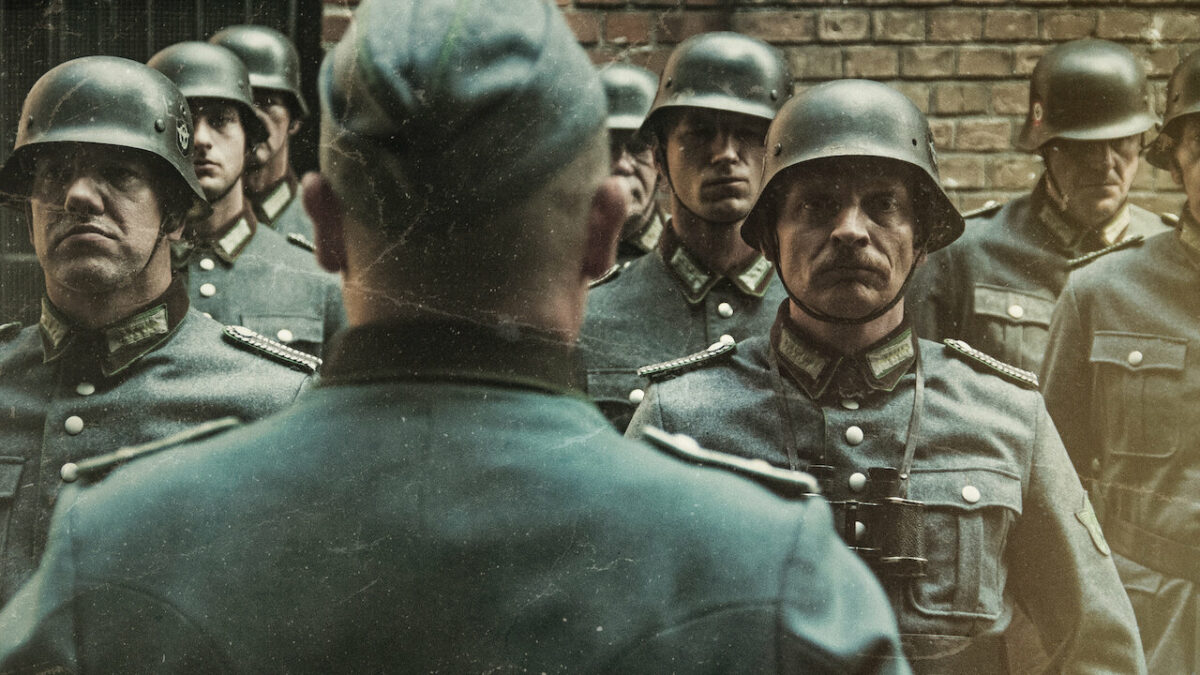by Bryan & Heather
The number of historical adaptations we’ve reviewed here on Concerning History is—well, not countless, but very high. Every fictional film, television series, or novel based on real events is inherently an adaptation, of course, and we’ve even seen projects that tell a fictional story based on a nonfiction monograph. Recently, however, we encountered a first for us: a documentary special adapted from Christopher Browning’s seminal work on the Holocaust, Ordinary Men: Reserve Police Battalion 101 and the Final Solution in Poland (narrated by the indomitable Brian Cox, no less). Bryan had read the monograph as part of his course on modern German history in undergrad but Heather ironically had not, despite her extensive German studies coursework. Always up for some more serious 20th century history, we promptly put it on.
Ordinary Men, in both documentary and print format, tells the story of a police battalion from Hamburg that was called up to join the Third Reich’s occupying forces in Poland during the Second World War. As one might expect, occupation duty under the Nazis, especially in the East, was not exactly in line with the Geneva Convention, and the primary role of this unit was the extermination of Jewish communities, mainly through firing squads. As one can surmise from its title, the main point of Ordinary Men is that the Holocaust was not conducted by only the most fanatical Nazis and members of the SS, but that legions of what we would consider normal people willing participated in genocide. In this, the documentary succeeds just as well as its source material, showing how the men of Police Battalion 101 were initially squeamish about carrying out their extermination orders, but that those orders were always optional—the harshest punishments meted out to objectors were denial of promotion and social pressure—and most either formed twisted ways of making it more “merciful” or even began to take macabre enjoyment in their bloody work. Equally, the film and its various talking heads (including Christopher Browning himself, of course) emphasize that the service of these men in Poland did not transform them into bloodthirsty killers for the rest of their lives; once they had returned to civilian life in Hamburg, none exhibited any violent tendencies or inability to fit back into society. At the same time, however, they mirrored the larger trend in post-war German society to ignore the intense suffering of their victims and protest that their own victimization at the hands of the Allies was somehow a more pressing issue.
While the spearhead of Ordinary Men’s argument certainly lands, though, we couldn’t help but wish it (and its source material) had fleshed out its subjects with so much more explicit societal and cultural context. Missing is the opinion of these men’s family, friends, and neighbors both during and after the war. Was Hamburg proud of their service? How were the few objectors received by the community? One particular story relates how an officer brought his new wife with him to Poland as their honeymoon and she was present for one of the massacres, but never actually relates what her reaction was! Similarly, the film’s attempt to demonstrate that all “ordinary” humans are capable of committing genocide only goes so far—all humans are also capable of not committing genocide, and so each individual genocide also depends on the specific conditions and morality of its community. Outside a few indirect references to antisemitism taught in classrooms, Ordinary Men sidesteps this topic and fails to explore how German society and morality in particular resulted in a society that largely rejected the humanity of Jews and other non-Germans, even if many people personally said that outright extermination went too far (while not actually doing anything to stop it, either). Nor does the documentary leverage the inherent implications of its main argument to explicitly challenge the prevailing myth that the Wehrmacht and wider German war machine was never involved in the Holocaust that continues to be perpetuated even in modern video games.
Ordinary Men, then, is a solid addition to the vast body of Second World War documentaries that adds necessary scholarship and complexity to what is so often fairly rote military history. Yet its fairly simple objective of observing these men’s existence and describing their service fails to engage in the kind of deeper analysis that could make it something truly special. Bryan’s original interaction with Browning’s work may indeed be the best context for it: consumed in combination with other supporting materials as part of a wider historical mosaic that not only grapples with humanity’s capacity for evil but also examines just how culpable German society as a whole was for the crimes of the Third Reich.
